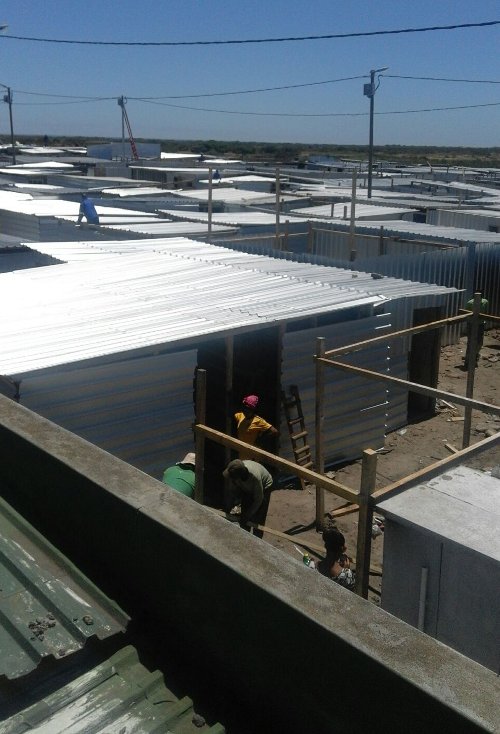Snags as Masiphumelele rebuilds after fire

It has been almost two weeks since a fire burnt down over a 1,000 homes in Masiphumelele’s Section E and Section D. While efforts are underway to rebuild, many residents are encountering snags.
The City of Cape Town is attempting to ensure that as shacks in the informal settlement are erected, enough space is left between them to reduce the risk of fire spreading, and to allow access to emergency vehicles. This is known as reblocking and it has worked effectively in, for example, Flamingo Crescent.
But this means more space is needed to accommodate everyone. While City representatives have committed to making more space available for those whose shacks will not fit into Section D and Section E, lack of clarity on where this new space will be has meant that residents desperate to ensure they have homes, are building in the areas between shacks that are supposed to be left empty.
A further problem is that some residents, such as Victor Vazi, have not received promised building materials. Vazi says, “When our houses burnt they told us within 48 hours 400 shacks will be built. We going two weeks now and some of us still don’t have material.”
“They also told us they were taking time because they wanted to fill the wet areas with sand but they haven’t done that also,” says Vazi. “They have failed to fulfil their promises and we are worried that this might cause a fight among the residents because some people have big houses while others have no houses.”
Some residents, such as Phindile Ndongeni, say they have registered their names on a list of people who need material, but they claim they are then told their names do not appear on the list.
“I registered the morning after the fire and the next day they told us that the list got lost. I registered again and again. Now when I am standing in line to get the building material I registered for I am told I don’t appear on the list. Why? The people I registered with are there,” says Ndongeni.
Residents have been divided into two groups. Those with numbers and those without numbers. Those without numbers are residents who were renting from those with numbers.
The ones with numbers received building material first. Since Monday they have been building their shacks day and night.
But many of those without numbers have received no materials yet and are still homeless.
 Many shacks have already been built in Section D and E of Masiphumelele. Photo by Thembela Ntongana.
Many shacks have already been built in Section D and E of Masiphumelele. Photo by Thembela Ntongana.
Ward Councillor Felicity Purchase says it will take a few more days to deal with residents who do not have numbers. “The only people that are not on the list are those that bought shacks illegally or built illegally.”
“Law enforcement are on site to remove the shacks that have been erected illegally and larger than the allocated space made available to all,” says Purchase.
She adds that if the size of shacks was complied with there would be place for all.
As far as GroundUp can tell though, no shacks that are larger than the allocated space have been removed. The situation is also complicated by stories like those of Bonginkosi Jolideli. “Some of us have families. The material that they gave us is only enough for one room and we use the old material to add on it to it to make a two room [shack] at least,” he says.
Some residents started building on land that doesn’t belong to the City. They have since been told to take their houses down but some have refused.
The City’s Mayoral Committee Member for Human Settlements, Councillor Benedicta van Minnen, says land invasion will not be tolerated. “The establishment of structures on firebreaks, which will again be to the detriment of thousands of residents, will not be tolerated. We urge the community to work with us, not to establish structures in the firebreaks, and to allow the City to proceed with its work in an unhindered, constructive and speedy manner,” she says.
Support independent journalism
Donate using Payfast

Don't miss out on the latest news
We respect your privacy, and promise we won't spam you.

This article is licensed under a Creative Commons Attribution-NoDerivatives 4.0 International License.
